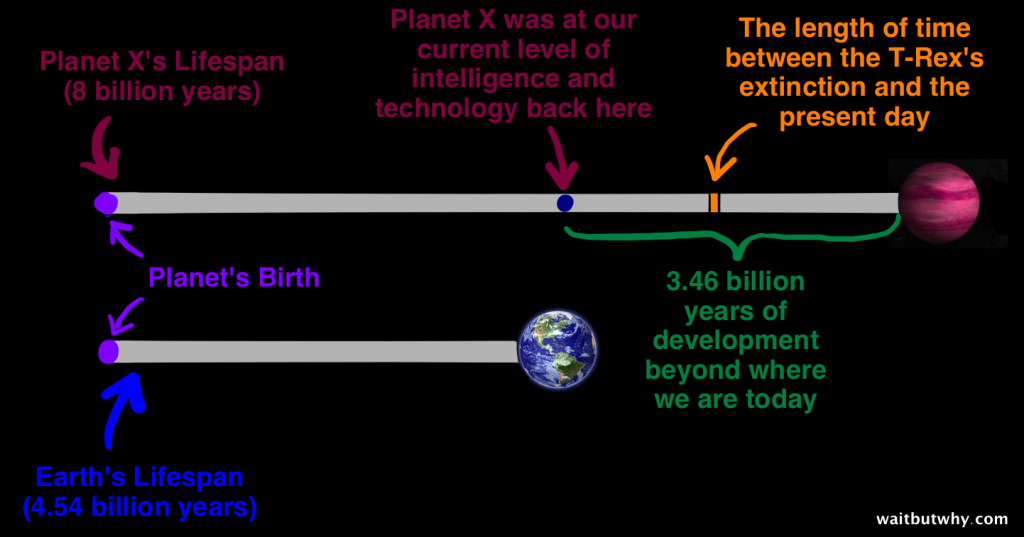
The Fermi paradox is the apparent contradiction between high estimates of the probability of the existence of extraterrestrial civilization and humanity’s lack of contact with, or evidence for, such civilizations.
In short: If they’re surely out there, why don’t we have proof?
Here’s an excellent article on the subject. I read it on my phone last night on a two-mile walk through Hollywood. Great read.
It begins by breaking down the math, putting things into perspective, illustrating how we are but a blip in the big scheme of things. The first takeaway is this:
Statistically, there are at least 100 billion Earth-like planets out there.
Think about that. Try. You can’t. The human mind can’t even fathom that number.
That brings us to a fair question: WHY ARE WE SO SPECIAL?
Concluding that intelligent life is exclusive to our planet wouldn’t be the first time we’ve thought we were the center of things. Not long ago, it was common knowledge that the sun revolved around Earth.
The read then takes us to the concept of Planet X, a hypothetical Earth-like planet. It also points out that our own sun is relatively young. Like, you know, billions of years younger than other suns. Here’s a graphic that illustrates the concept of an Earth-like planet, and asks us to consider the implications that arise if it’s billions of years older than us.

There are, of course, those of us who’ve concluded that there is no other life out there. They in fact assume that the lack of evidence of higher intelligence beings is evidence of their nonexistence.
That’s a flawed argument, and even more apparently so once you back up and look at the math. Our search for signals stretches only about 100 light years away from us. That’s only 0.1 percent the diameter of our galaxy, let alone the unviverse. See the little red circle in the image below? That’s all we’re able to see with our naked eye:

Concluding there’s no other intelligent life out there because we have no proof is like a young ant in the middle of the desert concluding there’s no other life in the world because nothing’s walked by in three days. (I’m not the first to use this analogy. Read on.)
There are a number of explanations for the silence. Here are ten, from the article:
1. Super-intelligent life could very well have already visited Earth, but before we were here.
In the scheme of things, sentient humans have only been around for about 50,000, a little blip of time — if contact happened before then, it might have made some ducks flip out and run into the water and that’s it. Further, recorded history only goes back 5,500 years — a group of ancient hunter-gatherer tribes may have experienced some crazy alien shit, but they had no good way to tell anyone in the future about it.
2. The galaxy has been colonized, but we just live in some desolate rural area of the galaxy.
The Americas may have been colonized by Europeans long before anyone in a small Inuit tribe in far northern Canada realized it had happened. There could be an urbanization component to the interstellar dwellings of higher species, in which all the neighboring solar systems in a certain area are colonized and in communication, and it would be impractical and purposeless for anyone to deal with coming all the way out to the random part of the spiral where we live.
3. The entire concept of physical colonization is a hilariously backward concept to a more advanced species.
Remember the picture of the Type II Civilization above with the sphere around their star? With all that energy, they might have created a perfect environment for themselves that satisfies their every need. They might have crazy-advanced ways of reducing their need for resources and zero interest in leaving their happy utopia to explore the cold, empty, undeveloped universe.
An even more advanced civilization might view the entire physical world as a horribly primitive place, having long ago conquered their own biology and uploaded their brains to a virtual reality, eternal-life paradise. Living in the physical world of biology, mortality, wants, and needs might seem to them the way we view primitive ocean species living in the frigid, dark sea. FYI, thinking about another life form having bested mortality makes me incredibly jealous and upset.
4. There are scary predator civilizations out there, and most intelligent life knows better than to broadcast any outgoing signals and advertise their location.
This is an unpleasant concept and would help explain the lack of any signals being received by the SETI satellites. It also means that we might be the super naive newbies who are being unbelievably stupid and risky by ever broadcasting outward signals. There’s a debate going on currently about whether we should engage in METI (Messaging to Extraterrestrial Intelligence — the reverse of SETI) or not, and most people say we should not. Stephen Hawking warns, “If aliens visit us, the outcome would be much as when Columbus landed in America, which didn’t turn out well for the Native Americans.” Even Carl Sagan (a general believer that any civilization advanced enough for interstellar travel would be altruistic, not hostile) called the practice of METI “deeply unwise and immature,” and recommended that “the newest children in a strange and uncertain cosmos should listen quietly for a long time, patiently learning about the universe and comparing notes, before shouting into an unknown jungle that we do not understand.” Scary.
5. There’s only one instance of higher-intelligent life — a “superpredator” civilization (like humans are here on Earth) — who is far more advanced than everyone else and keeps it that way by exterminating any intelligent civilization once they get past a certain level.
This would suck. The way it might work is that it’s an inefficient use of resources to exterminate all emerging intelligences, maybe because most die out on their own. But past a certain point, the super beings make their move — because to them, an emerging intelligent species becomes like a virus as it starts to grow and spread. This theory suggests that whoever was the first in the galaxy to reach intelligence won, and now no one else has a chance. This would explain the lack of activity out there because it would keep the number of super-intelligent civilizations to just one.
6. There’s plenty of activity and noise out there, but our technology is too primitive and we’re listening for the wrong things.
Like walking into a modern-day office building, turning on a walkie-talkie, and when you hear no activity (which of course you wouldn’t hear because everyone’s texting, not using walkie-talkies), determining that the building must be empty. Or maybe, as Carl Sagan has pointed out, it could be that our minds work exponentially faster or slower than another form of intelligence out there — e.g. it takes them 12 years to say “Hello,” and when we hear that communication, it just sounds like white noise to us.
7. We are receiving contact from other intelligent life, but the government is hiding it.
This is an idiotic theory, but I had to mention it because it’s talked about so much.
8. Higher civilizations are aware of us and observing us (AKA the “Zoo Hypothesis”).
As far as we know, super-intelligent civilizations exist in a tightly-regulated galaxy, and our Earth is treated like part of a vast and protected national park, with a strict “Look but don’t touch” rule for planets like ours. We wouldn’t notice them, because if a far smarter species wanted to observe us, it would know how to easily do so without us noticing. Maybe there’s a rule similar to the Star Trek’s “Prime Directive” which prohibits super-intelligent beings from making any open contact with lesser species like us or revealing themselves in any way, until the lesser species has reached a certain level of intelligence.
9. Higher civilizations are here, all around us. But we’re too primitive to perceive them.
Michio Kaku sums it up like this:
Let’s say we have an ant hill in the middle of the forest. And right next to the ant hill, they’re building a ten-lane super-highway. And the question is “Would the ants be able to understand what a ten-lane super-highway is? Would the ants be able to understand the technology and the intentions of the beings building the highway next to them?
So it’s not that we can’t pick up the signals from Planet X using our technology, it’s that we can’t even comprehend what the beings from Planet X are or what they’re trying to do. It’s so beyond us that even if they really wanted to enlighten us, it would be like trying to teach ants about the internet.
Along those lines, this may also be an answer to “Well if there are so many fancy Type III Civilizations, why haven’t they contacted us yet?” To answer that, let’s ask ourselves — when Pizarro made his way into Peru, did he stop for a while at an anthill to try to communicate? Was he magnanimous, trying to help the ants in the anthill? Did he become hostile and slow his original mission down in order to smash the anthill apart? Or was the anthill of complete and utter and eternal irrelevance to Pizarro? That might be our situation here.
10. We’re completely wrong about our reality.
There are a lot of ways we could just be totally off with everything we think. The universe might appear one way and be something else entirely, like a hologram. Or maybe we’re the aliens and we were planted here as an experiment or as a form of fertilizer. There’s even a chance that we’re all part of a computer simulation by some researcher from another world, and other forms of life simply weren’t programmed into the simulation.
The article goes into detail about “The Great Filter”, a concept we must first understand in order to wrap our brains around any of the above possibilities.
(via Huffington Post)










Comments on this entry are closed.